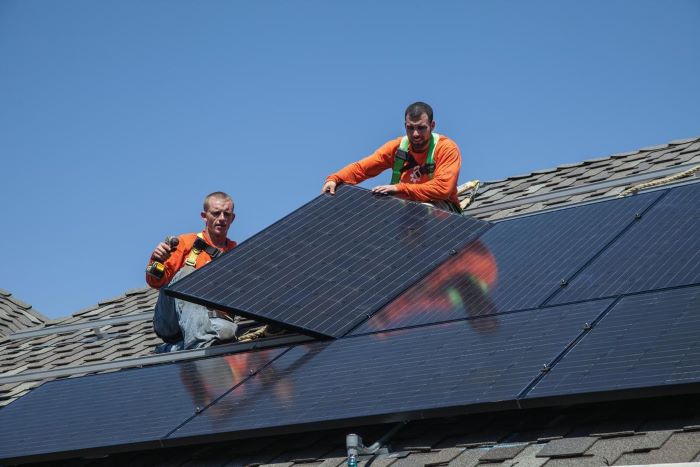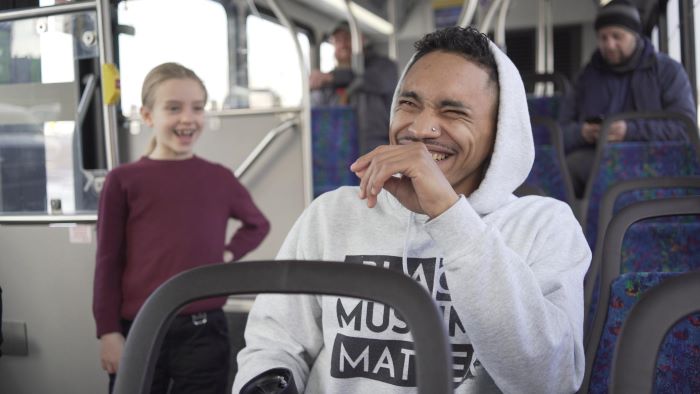The Sierra Club began the 2021 legislative session asking our lawmakers to pass bills that would help all Minnesotans with their basic rights — clean air, water, lands and a stable climate for future generations.
Together, we sent thousands of messages, hosted meetings with legislators, and lobbied leaders directly.
As expected from our divided government, the 2021 Legislative Session wraps up with both parties compromising on most bills.
Some of the legislation is worth celebrating, like getting a ban on PFAS -- also known as “forever chemicals” -- in food packaging, and $78 million going toward expanding transit, bicycling and walking. But on the whole, the Legislature ended far short of what our climate and communities need.
The Sierra Club advocated for big bills that will accomplish what science tells us is needed to address the climate crisis:
-
Moving to 100% clean electricity by 2040
-
Providing ongoing funding for transit
-
Building electric vehicle infrastructure, and more.
The House of Representatives passed historic bills that did just this, but Republicans blocked them in the Senate.
Typically, compromise is thought of as a positive, American attribute — and it should be. Unfortunately, the Republican Party is controlled by big oil and doesn’t often work in the best interest of Minnesotans or the climate.
We can trace this failure in leadership to lobbying from fossil fuel interests like Flint Hills Refinery and the Minnesota Chamber of Commerce, which includes many well-known companies with sustainability statements like Target and US Bank.
These groups clearly control the State Senate, where all Republicans voted that climate change is not caused by human activity.
Minnesotans across party lines and geographies want action for the climate. It's time we hold leaders accountable. They must work in the best interest of the public — not the fossil fuel corporations.
What Comes Next? Plans for 2022 — and Beyond
As the 2021 legislative session winds down, the Sierra Club is planning for 2022 and beyond.
We plan to increase pressure for climate action in hopes that Gov. Tim Walz will create a comprehensive, multi-sector, science-based climate action plan. Such a plan, including bills already passed by House Democrats in the 2021 legislative session, and bold proposals in 2022 would provide Minnesota voters a clear choice.
Voters’ priorities have shifted more than many elected officials have realized. Public support for climate action has continually and dramatically increased over the past six years. The governor must recognize this welcome shift.
Democrats in swing districts can go on the offensive on climate in their elections. Republicans in swing districts, by contrast, are trapped between “base” conservative voters still invested in climate denial and swing voters who do not tolerate denial anymore.Swing voters want climate action, and we are bringing this message to leaders
For more details on specific bills we were following please see:
Energy Bill
Transportation Bill
Environment Bill
Energy Bill
The Energy Omnibus Bill has now passed through both the House and Senate. It’s on its way to the governor for an expected signature.
While the bill has many good provisions, this version of the bill falls short. All of the strongest provisions necessary to reach our climate, clean energy, and equity goals found in the House version were stripped out. Even Senate author Dave Senjem himself acknowledged on the Senate floor on June 24, “This bill is a small step.”
What’s Included:
-
Solar on Schools and more. Solar energy investments, including solar on schools, solar on higher education institutions, and solar on landfills will create jobs, help transition these institutions to clean and renewable energy, and save hundreds of Minnesota K-12 school districts millions of dollars in energy operating costs while also promoting STEM education. It also includes funding to expand Mountain Iron’s solar panel plant, which will result in the plant becoming the largest solar panel producer in the U.S.
-
Energy Efficiency. Support for the Minnesota Efficient Technology Accelerator (META), a program that works hand-in-hand with the recently passed ECO Act to aid manufacturers in innovating around the efficient energy technologies of the future and supporting jobs in installation and maintenance.
-
Clean Energy Jobs. Numerous investments statewide that focus on clean energy jobs and workforce development, including a training center in North Minneapolis that intends to be a pipeline for BIPOC into the clean energy economy.
-
Buy Clean. Buildings are a major source of carbon pollution, both from heating and cooling and the materials used to construct them. This pilot will work to reduce emissions in the materials used to update our buildings and infrastructure, and support manufacturers who use sustainable materials and practices.
-
Natural Gas Innovation Act. This bill, led by CenterPoint Energy, fails to hold the utility and other gas utilities accountable for reducing greenhouse gas emissions. It also promotes so-called “Renewable Natural Gas” and encourages factory farms. What’s truly needed is real action to reduce pollution from natural gas by electrifying our homes and appliances. While we did not support this bill, due to hard work by clean energy advocates the final version does include useful pilot projects, additional state planning around decarbonizing gas utilities, and new climate emissions reporting requirements.
What’s Missing:
-
100% Bill. This bill is critical for equitably meeting our climate goals in Minnesota - not just for the existing supply of electricity, but to allow for more and more gas-to-electric conversions. In addition, this bill removed waste incineration from the definition of renewable energy in Minnesota and accelerated the inevitable closure of incinerators like the Hennepin Energy Recovery Center (HERC), which pollutes North Minneapolis. With the low cost of renewables and the declining cost of storage, there is no excuse for Minnesota not to be racing toward 100%. This bill was blocked by Senate republicans at the expense of all Minnesotans.Thanks to Rep. Jamie Long for getting this bill approved by the House.
-
Next Generation Climate Act. Clean electricity is necessary, but insufficient to tackle climate change in Minnesota, as only one quarter of our emissions come from the electricity sector. We also need to address the other three-fourths of our climate emissions, including from the transportation and agricultural sectors. This bill would finally put Minnesota on a path to address emissions in all sectors. Thanks to Rep. Patty Acomb and Sen. Jen McEwen for advancing this.
-
Electric Vehicle (EV) Incentives and Charging Infrastructure. These will help support Minnesota’s consumers, automobile dealers, and utilities in the rapid transition to cleaner vehicles. The Senate adamantly blocked all investments in EVs, because big oil wants their customers held captive to their products.
Transportation Bill
We’ve been fighting to provide all Minnesotans with options for how to get around quickly and cleanly for years.
This year’s transportation bill is a big win, and much thanks and credit goes to Rep. Frank Hornstein and the DFL-led House that fought to ensure Minnesotans funded transit, bicycling and walking — not just highways. The Legislature allocated $78 million in funding for critical, equitable transit, walking and bicycling, and safe routes to schools projects across the state. Read a good summary of the transportation bill in the Minnesota Reformer.
What’s Included:
-
Bus Rapid Transit, $57.5 Million. BRT is a fast, convenient, reliable bus service that helps make it possible for everyone, especially people without access to a car, to get where they need to go. Transit is efficient and reduces pollution in the transportation sector, which is currently the leading cause of greenhouse gas emissions in Minnesota and the nation. This funding will build the METRO E Line, which will serve the University of Minnesota, Marcy-Holmes, Downtown, Uptown and Southdale, and the METRO F Line, which will serve Central Avenue in Minneapolis and University Avenue in Anoka County.
-
Second Daily Amtrak Train to Chicago, $10 Million. Minnesota is finally doing its shareto benefit business, travelers, and the environment. You’ll be able to be part of reducing an estimated 17 million miles per year by taking the train to Chicago. Here’s a great video to learn more:
-
Transition Plan toward Zero Emissions Buses, $250,000. This funding will help Metro Transit’s transition to zero emission buses, which will be deployed in areas that already face disproportionate negative effects from air pollution.
-
Active Transportation, $5 Million. For years, the state has had a program to improve walking and bicycling connections from trails to sidewalks and bike lanes but it’s been unfunded . . . until now!
-
Safe Routes to School, $5 Million. This funding will help make it safer for students statewide to walk and bike to school.
What’s Missing:
-
New Ongoing Revenue. Although this one-time funding in the transportation bill is a big win, our fight continues for the transformative, long-term transit investments that our climate and communities urgently need. Our Transportation Forward coalition aims to build better transit, walking, bicycling, and rolling options that would serve Minnesotans of every race, ability, and income; would move the state toward achieving its climate action goals; and would provide greater opportunities for jobs, education, health care, and recreation. This requires about $600 million annually over the next 10 years, would build a comprehensive network of BRT lines and would be achieved through a $0.01 sales tax in the seven-county metro area.
-
Transit Fare Enforcement Reform. Sierra Club and our allies have been advocating to decriminalize fare non-payment and to create a supportive Transit Ambassador (or Agent) program. Minnesota’s current fare enforcement policy has harmed BIPOC transit riders disproportionately and it must change if we want transit systems that are welcoming, just, and well-functioning for everyone.
What We Kept Out:
The Sierra Club led a coalition of environmental organizations to successfully block increased ethanol mandates because we don’t have time for fake solutions to the climate crisis.
The ethanol industry, supported by Gov. Walz, wanted to mandate the sale of E-15 which consists of 15% ethanol and 85% gasoline. But we stopped them. Agribusiness which makes big profits from ethanol continues trying to greenwash ethanol as climate friendly.
However, the case for outdated ethanol is less persuasive than ever because electric vehicles have advanced so much. The climate advantages of electrification will only grow as our electricity supply keeps getting cleaner.
By contrast, ethanol and gasoline fuels already pollute the climate more than electricity – and they always will. Ethanol also causes or exacerbates other environmental harms, including loss of pollinators and pollution of our drinking water supply.
Gov. Walz got millions for ethanol subsidies in the Agriculture bill. That’s money that should be redirected to real solutions, like establishing statewide healthy-farming goals and a plan to reduce and sequester emissions in soil.
Environment Bill
The Environmental Bill has passed the Senate 49 - 16 and by 99 - 34 in the House. Ultimately this bill ended up being a mostly status quo bill that stripped many of the best provisions that were passed in the DFL-controlled House, but forestalled the worst of the anti-environment provisions proposed by the Republican-controlled Senate.
What’s Included:
-
No Reversal of Clean Cars. Thanks to administrative action that did not require legislative approval, Minnesota is set to become the 15th Clean Cars state in the nation and the first in the Midwest. Big Oil tried hard to prevent this. Unless the House agreed to repeal Clean Cars, the Senate again threatened to block part of our state’s budget. This threat lasted for months.With only a few days left before a partial government shutdown, Senate Republicans backed down and let the budget move forward without repealing Clean Cars. Thanks to Rep. Rick Hansen for standing strong.
-
PFAS “forever chemicals” ban. We are celebrating the protection of our health, with passage of the ban on PFAS (a terrible example of “forever chemicals”) in food packaging that was included in the final version. Thanks to Rep. Ami Wazlawik!
-
Increasing Forests’ Ability to Sequester Carbon. We applaud the new requirement for the Department of Natural Resources (DNR) to establish carbon sequestration goals in public and private forests. Our forests naturally act as carbon sinks. This requirement along with some funding now provides a great opportunity for Gov. Walz to act with the DNR to set the strong goal our climate and communities deserve. Thanks to Rep. Todd Lippert and Senators Patricia Torres Ray and Jason Isaacson!
-
Stopping Republican Hand-outs to Corporations. We are pleased that some of the most harmful provisions like giving corporate polluters an additional 16 years to obey environmental and public health laws were kept out of the final Senate version.
What’s Missing:
-
Environmental Justice Regulation. Disappointedly, the Frontline Community Protections Act was stripped from the final Senate bill. This sought to address environmental injustice by requiring the Pollution Control Agency to perform a cumulative impact analysis of new or expanded projects seeking permits when they are located in or near communities living in environmental justice areas.
It’s because this bill did not move the needle in many key areas that 16 DFL Senators went ahead and voted “no,” signalling that they expect the state to stand-up for Minnesotans over polluters.
To get a better understanding of the negotiations and the Sierra Club’s position on them, read through this Minnesota Environmental Partnership letter that describes what policies -- good and bad -- both the House and Senate brought to the conference committee.
These bills have real impacts on our lives, health, and those of plant and animal communities. With your support, we are proud to advocate for clean water, lands, and a healthy climate. Now, we look to the future where we will continue holding leaders accountable for the bills they propose and vote on.


